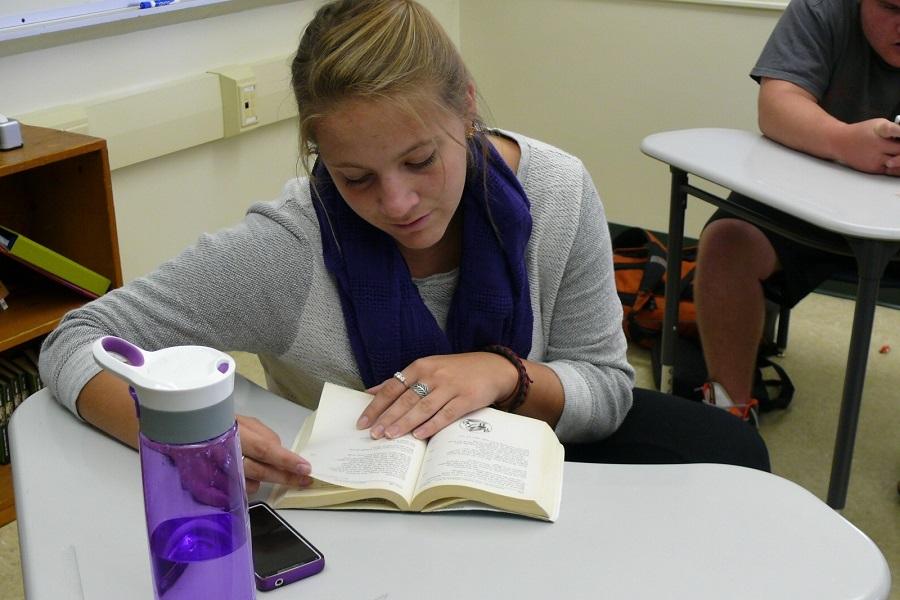Reading: Why it’s important (Editorial)
Senior Jamie Frohm gets engrossed in the play, Oedipus Rex, during English class. Reading offers the opportunity to be transported to a different time and place.
If books weren’t important, would Hitler have burned them?
Reading, in many cases, serves as an escape from reality. It takes a person’s mind off of their troubles. We’re transported into a different place, a different time. We become the characters in the book, and we’re pulled from our own troubles into a life of adventure.
Just as we can lose ourselves in stories, we can find ourselves in them.
David Mikics from New York Times wrote in his editorial, “In Praise of (Offline) Slow Reading,” that “recent work in sociology and psychology suggests that reading books, a private experience, is an important aspect of coming to know who we are.”
The mark of a great story is it’s relatability; if the reader finds themselves in the story, their enjoyment of the story heightens–and they find a little bit of who they are.
The only thing that offers more cultural awareness than books is traveling itself. However, as traveling to different countries can be pretty pricey (not to mention the planning and time that goes into an international trip), reading offers a cheaper, more accessible alternative for growing familiar with foreign cultures.
Independent reading has also been proven to have an effect on the achievement of the student.
S. Jay Samuels and Yi-Chen Wu from the University of Minnesota ran an experiment to test this.
“Data analysis found that more time spent reading had a significant effect on achievement compared to a control condition where less time was allocated for independent reading,” Samuels and Wu wrote in their report.
Many students claim they don’t read because they don’t have time. But could it be that they just use that time in different, less beneficial ways?
Elona Hartjes, a retired teacher who now writes for the blog, Teachers at Risk wrote, “Young people now devote an average of 7 hours, 38 minutes to daily media use, or about 53 hours a week — more than a full-time job.”
The time spent on social media sites could be reduced, and leave much more time for things like reading and real socializing.
Disclaimer: Articles designated as “Editorial” represent the views and opinions of the author, not the 2014-2015 Periscope staff, CHS Administration or the CHS student body.
Want to help the Herd? Please consider supporting the Periscope program. Your donation will support the student journalists of CHS and allow us to purchase equipment, send students to workshops/camps, and cover our annual website hosting costs.

Sarah Payne is in 10th grade. She works in Periscope as a Perspectives Writer. She reads, writes, and watches movies. Her favorite book is the Hobbit,...





























































































Gretal Shank • Dec 10, 2017 at 12:25 am
Oh I love books so much.
Francesca DiPaola • Nov 3, 2014 at 8:32 am
Reading is extremely important, and I think everybody should know that by now. Kids who read are more successful in school, and they tend to be more intelligent. In elementary school the kids who read more learned faster and were more advanced than the kids who didn’t read. Reading is amazing, and schools should be promoting kids to want to read books for the fun of it, because if kids can do that, it will surely benefit them greatly.
Claire Hillison • Oct 29, 2014 at 9:20 pm
Wow, this is a really great article! Reading is so so so important but it often is overlooked. I am glad someone is talking about it!
Katie Dworak • Oct 28, 2014 at 2:41 pm
I deleted all of my social media my sophomore year. At first I couldn’t fathom what I had just done. But, as the says went on, I came to understand how much more productive I became. It also allowed me to focus much more on myself, for other peoples’ problems were not constantly on my radar. I really believe it’s a great move that everyone should try at some point.
Brandin • Oct 27, 2014 at 1:23 pm
Whenever I sit down to read a good book I get sucked in. I can read for hours if I enjoy the book. I like reading and imagining that I am in the middle of the story and can connect better to characters and understand the story better this way.
Kenleigh Peet • Oct 27, 2014 at 8:25 am
I think that while technology has become a giant distraction, I believe that it can really benefit both young and old minds. Technology makes books and articles much more accessible then they used to be. I can basically type a title into google and read it, that’s super rad!
Julia Pantleo • Oct 24, 2014 at 1:26 pm
Wow, I had no idea people spent THAT much time on social media. How does anyone have time in the day to do that, with school/work and sleep taking up so much of the day already.
Parker Kendall • Oct 23, 2014 at 9:37 am
I had no idea people spent that much time on social media! I come from a family that spends many hours a week reading, and ive never found anything more relaxing or entertaining as a good story.
Michaela McQuaig • Oct 22, 2014 at 10:57 pm
Those statistics are really mind blowing. More social media than a full time job?! that’s crazy, but I can believe it sadly enough. I mean, discussions used to be about the latest cool book everyone read and now the talk is mostly about the newest show on Netflix that people binge watch (and then complain about how little sleep they get and how little of their homework they have done). Books are great places to lose yourself- and an age old classic picture to curl up with a good book as a comfort. Great article!
Joshua Winton • Oct 22, 2014 at 9:35 am
We definitely spend way too much time using media. I mean, look, Jamie can’t even take her phone off the desk while she’s reading. I think I need to work on this in my own life and try to spend more time reading and doing other things.
Rachel Day • Oct 10, 2014 at 11:02 am
Wow, that’s a lot of time devoted to media use. Some of that time should definitely be reduced and spent doing something more productive.